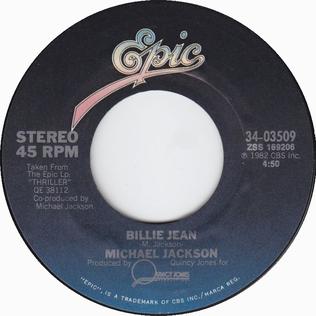
"Billie Jean" is a song by American singer Michael Jackson, released by Epic Records on January 2, 1983, as the second single from his sixth studio album, Thriller (1982). It was written and composed by Jackson and produced by Jackson and Quincy Jones. "Billie Jean" blends post-disco, R&B, funk, and dance-pop. The lyrics describe a woman, Billie Jean, who claims that the narrator is the father of her newborn son, which he denies. Jackson said the lyrics were based on groupies' claims about his older brothers when he toured with them as the Jackson 5.

"So Emotional" is a song by American singer Whitney Houston. It was released as the third single from her second studio album Whitney (1987) on October 12, 1987 by Arista Records. The song was written by Billy Steinberg and Tom Kelly and produced by Narada Michael Walden.

"Help!" is a song by the English rock band the Beatles that served as the title song for the 1965 film and its soundtrack album. It was released as a single in July 1965, and was number one for three weeks in the United States and the United Kingdom.

"Is This Love" is a song by British rock band Whitesnake. It was released in 1987 as the second single from their self-titled album.
"A Groovy Kind of Love" is a song written by Toni Wine and Carole Bayer Sager based on a melody by the classical composer Muzio Clementi.

"My Love Is Your Love" is a song by American singer Whitney Houston. It was written and produced by Wyclef Jean and Jerry Duplessis for Houston’s fourth studio album of the same name (1998). Released on June 21, 1999, as the album's fourth single, it received positive reviews and was successful worldwide, hitting the top 10 in 23 international markets. The song peaked at number four on the US Billboard Hot 100, number two in the United Kingdom, and number one in New Zealand. It was later certified platinum by the Recording Industry Association of America (RIAA).

"Nothing's Gonna Change My Love for You" is a song written by composers Michael Masser and Gerry Goffin. It was originally recorded by American singer and guitarist George Benson for his 1985 studio album 20/20, released by Warner Bros. Records. This original version was produced by co-writer Masser, and was released as a single in Europe only in 1985. Two years later, in 1987, Hawaiian singer Glenn Medeiros sang his version of the song which became a worldwide success.

"La Poupée qui fait non" is a 1966 song written by Franck Gérald (lyrics) and French singer/songwriter Michel Polnareff (music). It was recorded by Polnareff, becoming an immediate success in France and one of Polnareff most definitive songs. Jimmy Page played guitar on the recording. It also appeared as the last track in his album Love Me, Please Love Me.

"Le Jerk !" is a 1989 song recorded by French musician Thierry Hazard. It is the first single from his debut album Pop Music and was one of the 1990 summer hits in France. It is also Hazard's signature song, although he has released other successful songs.

"4 Mots sur un piano" is a 2007 song recorded by French singers Patrick Fiori, Jean-Jacques Goldman, who also had written the lyrics, and Christine Ricol. It was released as the second single - after "Toutes les peines" - from Fiori's album Si on chantait plus fort on July 20, 2007. The single was very successful, particularly in France where it topped the chart.

"Flash", also recorded in an English-language version under the title "One Love to Give", is a 1986 song recorded by Princess Stéphanie of Monaco. It was the second single of her first album, Besoin. Released at the end of 1986, it was a hit in several countries, including Sweden where it reached number one on the chart.
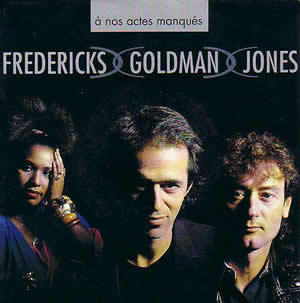
"À nos actes manqués" is a 1991 song recorded by the French trio Jean-Jacques Goldman, Carole Fredericks and Michael Jones. Released as the second single from their eponymous album, the song was one of the summer hits in France and was the trio's most successful single in terms of ranks on the chart. In 2011, M. Pokora covered the song on his album Mise à Jour and released it as a single, which achieved some success in French-speaking countries. The trio also released an English version, To The Deeds We Missed.
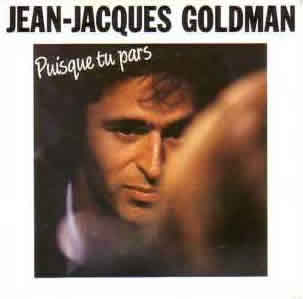
"Puisque tu pars" is a 1987 song recorded by the French singer Jean-Jacques Goldman. It was released in July 1988 as the fourth single from his album Entre gris clair et gris foncé, on which it features as the sixth track in an extended version. The song was a number three hit in France.

"Il y a trop de gens qui t'aiment" is the name of a 1999 song recorded by French artist Hélène Ségara. It was the first single from her second studio album, Au Nom d'une Femme, on which it features as first track. Released in November 1999, the song became a hit in Belgium (Wallonia) and France, topping the singles charts.
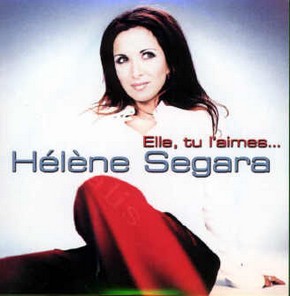
"Elle, tu l'aimes..." is a 1999 song recorded by French artist Hélène Ségara, released on April 18, 2000. It was the second single from her second studio album, Au Nom d'une Femme, on which it features as the fourth track. Although it failed to reach number one on the charts, it was a hit like Ségara's previous single, "Il y a trop de gens qui t'aiment".
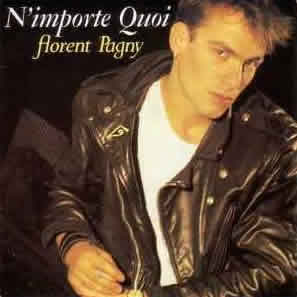
"N'importe quoi" is the name of a 1987 song recorded by the French artist Florent Pagny. It was his debut single, released in March 1988. It became a big hit in France, topping the chart for two months and is Pagny's second best-selling single in terms of charts and sales, after "Savoir aimer".

"Les Valses de Vienne" is a 1989 song originally recorded by the French artist François Feldman for his 1989 album, Une Présence and was the second singles release from that album in November of the same year. It achieved great success in France, topping the chart for six nonconsecutive weeks, and remains Feldman's signature song and a classic of 1980s French music.

"Dingue, dingue, dingue" is a 2009 song recorded by French singer Christophe Maé. It was the lead single from his third studio album On trace la route, and his eighth single overall. An official statement from his label Warner Music announced the single would be released to radio stations on 27 November 2009 after a CD promo was sent. It was later released digitally on 7 December and physically on 25 January 2010. It achieved success in France, being Maé's second number one hit single after "On s'attache" in 2007.

Jean Jacques Smoothie is a British DJ, producer, and record label founder. Originally from Gloucester, England, Robson moved in 1994 to Cardiff, Wales, where he began DJing and founded a record label, Plastic Raygun, with some friends.

Romano Musumarra is an Italian composer, arranger, musician and record producer.



















